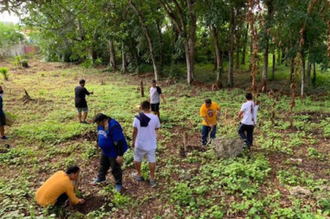Philippines: Diocese plants 60,000 trees in one day

Parish tree planters out in force - Image Diocese of Tagbilaran, Bohol
Source: Vatican News/Diocese of Tagbilaran
Thousands of priests and religious, families, young people and children, planted more than 60,000 saplings on Sunday, in parishes across the Diocese of Tagbilaran, in the central Philippine province of Bohol as part of their Season of Creation.
Bishop Alberto Uy of Tagbilaran said they planted a variety of fruit-bearing and hardwood trees.
The initiative was one of many activities of the Philippine Catholic Church during the worldwide ecumenical Season of Creation, from September 1 to October 4. The Church in the Philippines has extended the period by a week to October 11.
More than 70 church and civil society organizations inaugurated the Philippine celebration of the Season on 1 September. At least 100 volunteers in every parish of Tagbilaran joined the initiative and planted 10 trees each in their surroundings, backyards, and other designated areas.
Bishop Uy said every Christian is called to care about God's creation, pointing out that trees not only beautify the surroundings but also bring many practical benefits to people. "May all of us develop a love for nature and start caring for the environment," he prayed.
According to figures from Global Forest Watch (GFW), which monitors global forests in near real-time, the Philippines had 13.2 million hectares of natural forest, extending over 62% of its land area. In 2019, it lost 48.2 thousand hectares of natural forest, equivalent to 19.1 million metric tons of CO 2 emissions.
From 2001 to 2019, the Philippines lost 1.23 million hectares of tree cover, equivalent to a 6.6% decrease in tree cover since 2000, and 498 million metric tons of CO 2 emissions.
GFW also noted that in 2010, Bohol had 165,000 hectares of tree cover, extending to over 41 percent of its land area. In 2017, the tourist destination island lost 583 hectares of tree cover, losing the capacity to capture an equivalent of 57.4 kilotons of carbon dioxide emissions.
Bishop Uy, whose diocese is spearheading other social action projects, including the provision of low-cost housing for the underprivileged, explained that instead of the usual mahogany and gmelina species, Bohol is now going for the local species and preferably fruit-bearing trees.


















